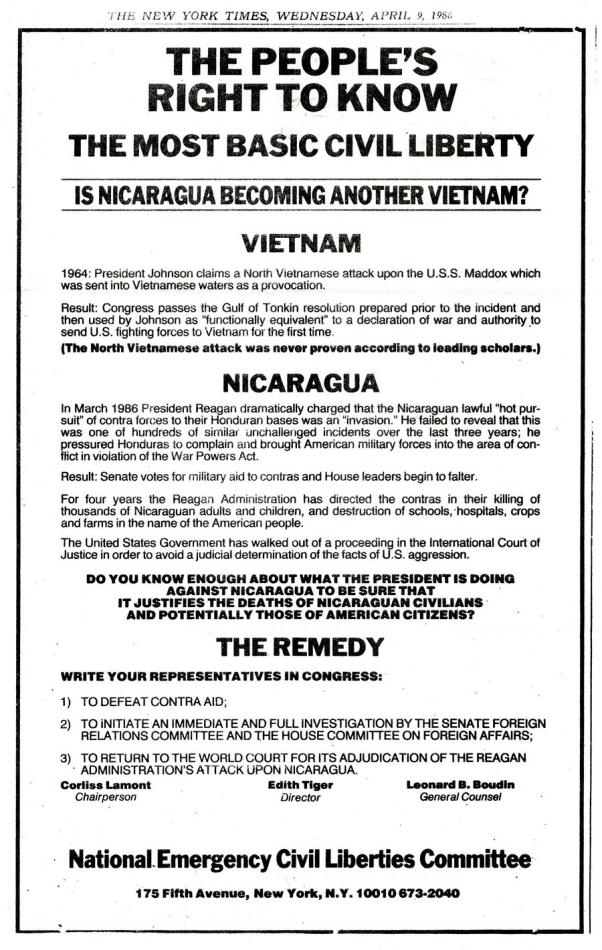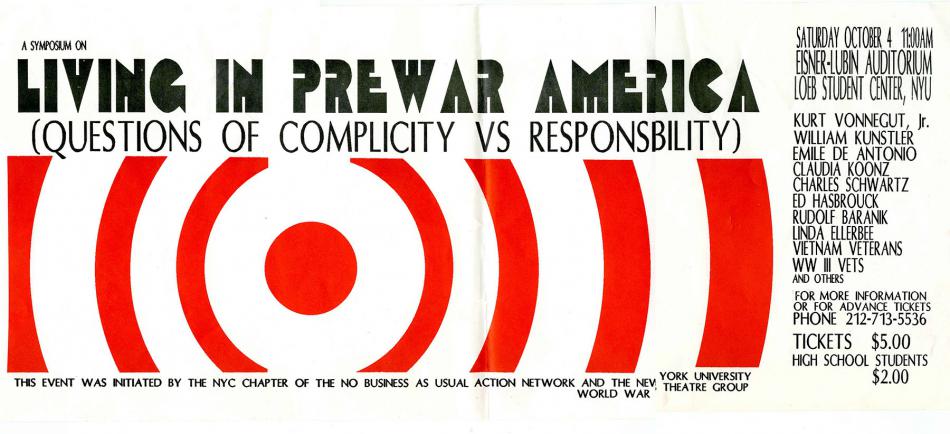Emile de Antonio’s political activism extended beyond his completed films, but it was often intertwined with his work. For example, de Antonio was long critical of the federal government’s surveillance of its own citizens, and he often ordered Freedom of Information Act reports on himself—these itemscan be viewed in the collection. In 1980, de Antonio joined other plaintiffs in a landmark case that prevented the destruction of thousands of Federal Bureau of Investigation records. Judge Harold H. Greene, of the United States District Court, District of Columbia, ruled in favor of the plaintiffs of American Friends Service Committee et. al. v. William H. Webster et. al. The judge forbade the National Archives from disposing of FBI records without proper oversight, based on plaintiffs’ claims that historically significant records were being destroyed. Not only did de Antonio maintain animosity toward FBI surveillance through his filmmaking, he stood up as a citizen to preserve the evidence of the agency’s troubled history. The collection holds miscellany from this milestone case, as well as a recording of an interview de Antonio conducted with Marshall Perlin, attorney for A.F.S.C v. William H. Webster as well as for the plaintiffs in the iconic 1951 espionage case against Julius and Ethel Rosenberg.
In 1975, de Antonio bought the rights to Philip Agee’s book, Inside the Company, and planned to make a feature-length fiction film about the former CIA operative’s life. According to letters exchanged with Agee, de Antonio had wanted Martin Sheen to star as Agee and Marlon Brando to play Allen Dulles. De Antonio’s prospectus demonstrates that, though the film would be a fictionalized version of Agee’s life, its style wouldn’t stray too far from de Antonio’s prior projects.
“Its emphasis will not be on tricks of the trade, but on exposing the political context for these activities and exploring the reasons for Agee’s conversion. And its form will not be linear adventure, but will be flexible enough to include documentary material—either existing footage of Latin American political events, or interviews done expressly for the film.”
 The focus on hidden political imperatives rather than espionage excitement, and the potential use of documentary material (in spite of, or because of, its potential to rupture the surface), aligns the project with de Antonio’s films on Vietnam and Nixon. Before the project was scrapped for lack of financing, among other troubles, de Antonio conducted interviews with Agee. The collection includes de Antonio’s treatment for his fiction film, as well as a treatment and distribution proposal for Allen Francovich’s documentary on the same subject. De Antonio and Francovich corresponded, encouraging each other once they had determined that their respective projects would not be competing.
The focus on hidden political imperatives rather than espionage excitement, and the potential use of documentary material (in spite of, or because of, its potential to rupture the surface), aligns the project with de Antonio’s films on Vietnam and Nixon. Before the project was scrapped for lack of financing, among other troubles, de Antonio conducted interviews with Agee. The collection includes de Antonio’s treatment for his fiction film, as well as a treatment and distribution proposal for Allen Francovich’s documentary on the same subject. De Antonio and Francovich corresponded, encouraging each other once they had determined that their respective projects would not be competing.
During the 1970s and 1980s, de Antonio was a member of the National Emergency Civil Liberties Committee (now part of the Center for Constitutional Rights). The collection holds his correspondence and meeting minutes from 1980 to 1988, as well as materials on topics of interest to the filmmaker, like legal comments on television networks’ responsibility to serve the public interest, dated 1977, and a report on the Reagan administration and Nicaragua, dated 1985. In 1987, de Antonio co-founded the human rights group Refuse and Resist! along with other New Leftists including Dore Ashton, William Kunstler, and Abbie Hoffman. The group, with outposts across the United States, campaigned against the censorship of art, the Gulf War, the war on drugs, and numerous other human rights issues. The collection holds de Antonio’s correspondence and notes about the organization through 1989, the year of his death, including reports on Resist in Concert!, a fundraising concert in New York City in 1988 featuring major pop artists like Sinead O’Connor and De La Soul. The institutional records for Refuse and Resist!, which disbanded in 2006, are held by the Tamiment Library at New York University.
De Antonio’s interest in combating neo-conservatism extended from his civic activities to his creative work with the manuscript for The George Bush Dilemma, co-authored with firebrand and gonzo journalist Warren Hinckle. While de Antonio is mostly known for his film work, he was also a published author, generally adapting his films into printed form. Nearly complete but unpublished, The George Bush Dilemma’s main thrust is that wiping out communism, a symbolic political goal, was more important to President Ronald Reagan and Vice President George Bush than finding solutions to the more concrete and arguably more destructive domestic drug problem and international war on drugs. Returning to the site of his most productive years, the book draws parallels between Reagan and the mid-century American politicians who were so blinkered by the specter of communism that they blundered into a conflict in Vietnam. De Antonio structured his section of the book as a collage of transcripts of the Senate Subcommittee on Drugs, Law Enforcement and Foreign Policy (or the 1988 Kerry Committee), allowing his reader to see the primary documents firsthand. This collage style is a riff on his “radical scavenging” method of filmmaking; de Antonio even calls his contribution to the book “what really happened in Ronald Reagan’s last movie.”

